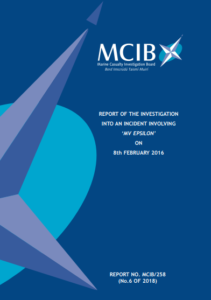The Marine Casualty Investigation Board released its report about the heavy rolling of the ‘MV Epsilon’, on February 8, 2016, while it was sailing from Cherbourg in France. As a result, ten passengers and two crew members got injured.
The incident
On February 7 2016, ‘MV Epsilon’ sailed from Cherbourg in France heading for Dublin, Ireland. After leaving Cherbourg, the ship sailed across the English Channel in a north-westerly direction. It then went in a westerly direction along the English Channel in the direction of Land’s End.
[smlsubform prepend=”GET THE SAFETY4SEA IN YOUR INBOX!” showname=false emailtxt=”” emailholder=”Enter your email address” showsubmit=true submittxt=”Submit” jsthanks=false thankyou=”Thank you for subscribing to our mailing list”]
As the vessel was sailing west, the increasing westerly wind and sea conditions reduced its speed over the ground. During the night, the vessel’s speed was further reduced because of the effects of the deteriorating weather and sea conditions. The vessel however, continued around Land’s End in a northwesterly direction before turning on to a north-easterly course.
As the wind and weather continued to worsen, the Master decided to seek shelter in Barnstaple Bay. After entering the bay and assessed the conditions for anchoring, the Master decided it would not be safe to anchor. So, he advised all shipboard departments that he will ‘slow-steam’ back and forth across the bay until the weather conditions improved.
Nevertheless, during one turn the vessel rolled heavily and the cargo on decks one, three, four and five shifted, damaging the cargo and causing some injuries to crew and to passengers.
When the weather improved sufficiently, the vessel left from Barnstaple Bay and continued its passage to Dublin Port, arriving on the morning of the 9th February 2016.
Ten passengers and two crew members got injured.
Probable cause
After investigating the incident, the Marine Casualty Investigation Board concluded to the following:
- ‘Nowcasting’ was the primary source of weather forecasting on board. Neither Master was familiar with the route forecast function and did not use it.
- The forecast which the senior Master reviewed gave the hourly data for the Celtic Sea. However, it indicated that the sea conditions would exceed the 8.0 m agreed limit before the vessel reached the shelter of the Irish coast. This was exacerbated by the fact that the forecast was not automatically updating on the bridge computer.
- The senior Master noted the concerns of the night-time duty Master, but he was of the view that the vessel could outrun the weather and reach the shelter of the Irish coast before the worst of the weather arrived.
- The night-time duty Master did not take the opportunity of seeking shelter before rounding Land’s End.
- The vessel’s ‘Red Code’ lashing system was considered by the company to be a variation of the cargo securing manual as it is based on vessel and route experience and needs total lashing strengths in excess of that required by the manual. However, it was not approved by the flag state Italy, or a recognised organisation.
- If the company considered that the cargo securing manual was not enough, it should have amended it and submitted it to the flag state for review and approval. Pending this, the ship must be operated accordance with the existing approved cargo securing manual.
- The ship operated in a mixed mode operation consisting of a repeating cycle of short-sea cross-channel voyages during the week and with single longer voyages to the continent at the end of the week. The ‘MV Epsilon’ used the Deck 30 form for change of command which was acceptable for short voyages but was specifically not to be used for longer voyages. It appears that the change of command was not performed in accordance with the required procedures.
Recommendations
MCIB had to recommendations to make in regarding to this accident:
- It is recommended that Italy, as the flag state, reviews and considers the conclusions highlighted in this report in relation to the safety management system, weather forecasting and cargo securing.
The company should:
- Clarify the roles of the senior Master and the duty Master in order to ensure the effective safety management of the ship and the change of command in mixed mode operation;
- Consider and review the training and system requirements for weather forecasting on their ships;
- Make sure that the cargo securing manual is approved by the flag state for their ships;
- Make sure that the appropriate cargo securing arrangements are used on their ships and that their ships are operated accordingly.
You may see further details in the PDF herebelow





























































